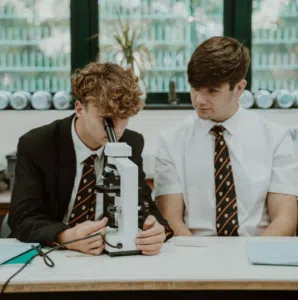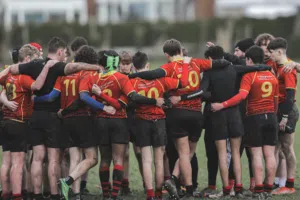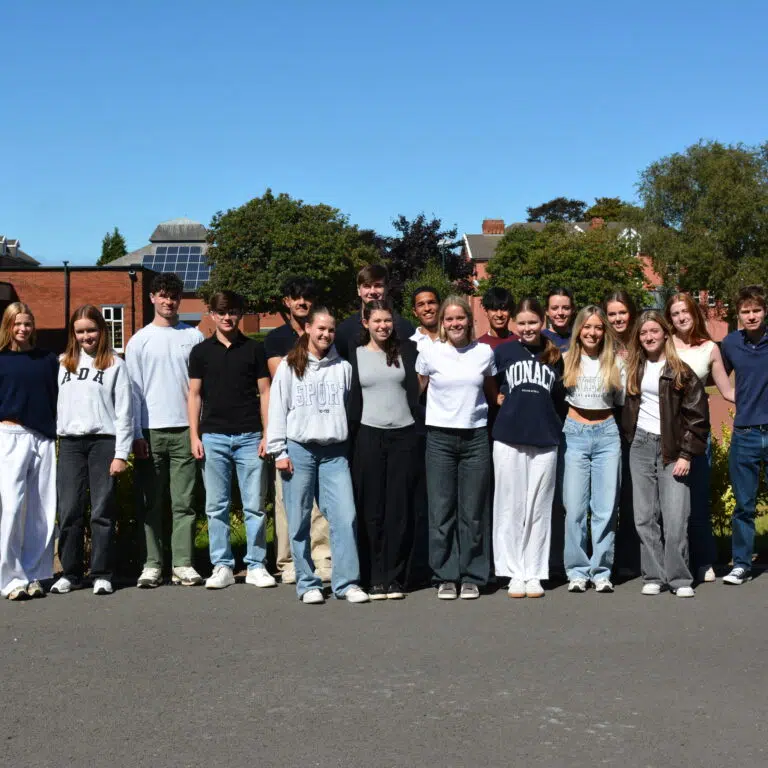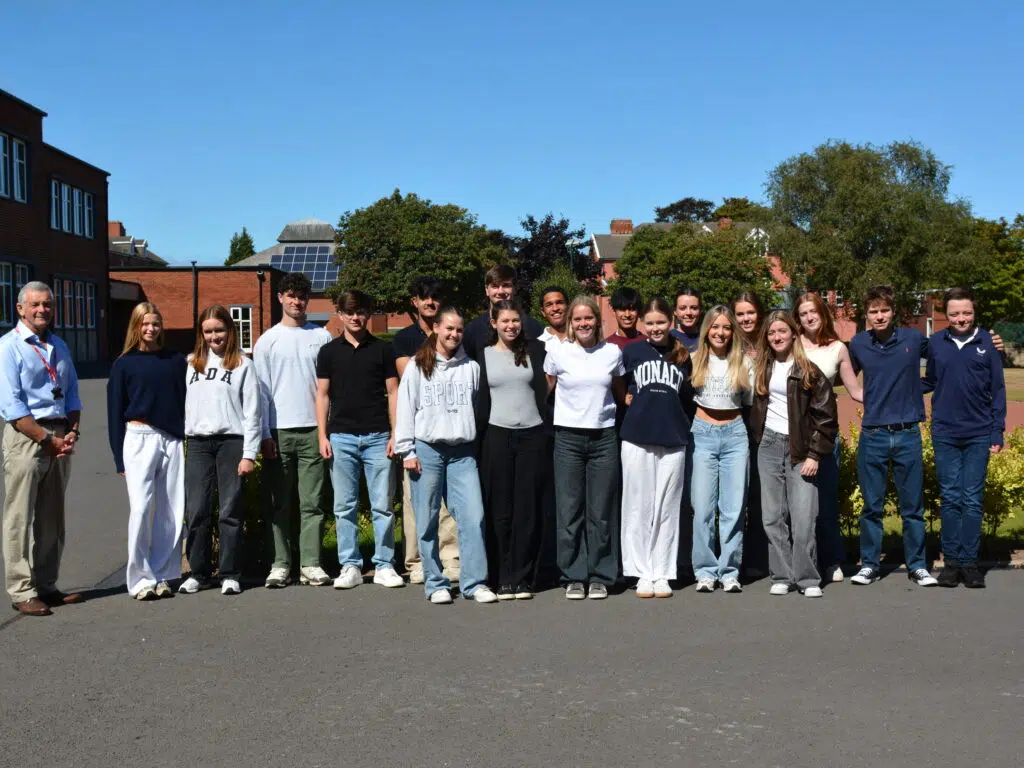By Adham S, Sixth Form Prefect
Leadership is one of those words we hear a lot in school. It pops up in assemblies, appears on posters, and is encouraged in school through various bodies such as student council and school prefects. But as I discovered during our recent Leadership Training Day, leadership is a lot more than a title or having a set of wings on your back—it’s about responsibility, teamwork and awareness. This day gave us the opportunity to pause, reflect, and learn what it really means to be an effective leader.
We were extremely fortunate to have our training led by Mr. Ian Huntley, a man whose background in leadership is as impressive as it is wide-ranging. He was started in the Royal Marines and went on to serve across the world in places like Northern Ireland, Northern Iraq, and Afghanistan, where he was deputy task force commander. He has dealt with counter-terrorism, nuclear security, and even worked on strategy in the Ministry of Defence and the Cabinet Office. Later in his career, he became the head of the MOD’s Leadership Training Centre, where his job was to develop the leadership capacity of senior officers and civil servants. Since leaving the Marines in 2016, he has continued to work as a leadership consultant, now advising organisations like the NHS, the police, and industry. Despite that intimidating resume, he came to us not as a lecturer but as someone keen to share what he had learned, with humour, to give us practical ways to think about our own leadership.
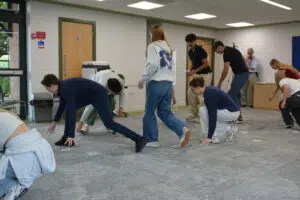



We began the day by reflecting on what leadership meant to each of us personally. There was no official definition to memorise, just a chance to think. For me, the exercise was eye-opening. I realised that multiple people have different ideas and interpretations of what leadership means, despite everyone in the room being some kind of leader, what traits people prioritised varied wildly. Mr. Huntley helped us think about the traits of top-performing leaders and teams, and what separates the best from the rest. At that stage, it felt theoretical, but it didn’t take long before we were putting ideas into practice.
The next session was about meetings—yes, meetings, which I’ll admit sounded unglamorous and mundane at first; but as Mr. Huntley pointed out, an enormous amount of life is spent in meetings, whether formal or informal. Knowing how to run them well is a leadership skill in itself. We discussed the importance of clarity of purpose, focus, and making sure everyone has a voice. Then we split into two groups—Port and Starboard, in a nod to Mr. Huntley’s naval background, to plan a meeting about how to help people become more effective leaders. Even at this stage, the dynamics of leadership were visible. Some people spoke a lot, others waited to be asked, and I found myself torn between contributing ideas and making sure I wasn’t crowding out quieter voices. It was a small reminder that leadership is often less about what you say and more about creating the right environment for others to speak.
The highlight of the day, however, was the team-building activity. The task was simple in theory: stack a bottle on top of a four-cup-high paper cup pyramid using only an elastic band controlled by eight strings, each with a wire loop that we had to hook onto our fingers. In practice, it was chaos. The pyramid wobbled, collapsed, and had to be rebuilt more than once. We tried to coordinate, failed to coordinate, shouted over each other, and at one point it looked like we were less of a team and more of a circus act. Needless to say, we didn’t manage to beat last year’s cohort.


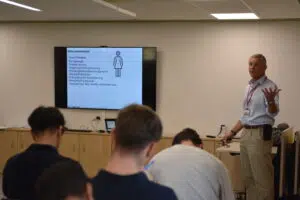

But the point of the challenge wasn’t winning. The real value came when we watched ourselves back on video. It was both hilarious and very awkward to see our behaviour from the outside. Who tried to take charge? Who hung back? Who quietly did the work while others argued? It was fascinating to see how power dynamics and personalities emerged under pressure. For me, the reflection afterwards was invaluable. Overall, I was happy with my performance and my willingness to take the lead; however, at times I noticed I was jumping to apply people’s solutions too quickly. The group could have benefited if we took time to consider each idea, to find the most optimal plan to execute.
After each video, we analysed what helped and what hindered the group’s performance. Then we wrote personal reflections, identifying what we had learned about ourselves. This wasn’t just about leadership in theory—it was about holding up a mirror and asking difficult questions. Am I dependable? Do I give others space to contribute? Do I create a sense of psychological safety for those around me?
Psychological safety, as we learned, is one of the three essential qualities of high-performing teams, alongside dependability and equality of input. Dependability is obvious enough: if people can’t rely on you, everything falls apart. Equality of input is about making sure everyone has a chance to contribute, rather than letting the loudest voices dominate. But psychological safety was the one that struck me most. It means believing you can speak up without fear of embarrassment or punishment. In a school context, that matters more than we often realise. If a younger student feels too nervous to voice an idea in class or to tell us about a problem in the corridor, then something is wrong. As prefects, one of our key roles is to create that environment of safety, where others feel heard.
Another important lesson of the day was the idea of awareness. Mr. Huntley explained that leaders need three kinds: intra-awareness, inter-awareness, and extra-awareness. Intra-awareness is about knowing yourself—your strengths, weaknesses, and tendencies. Inter-awareness is about understanding other people—their perspectives and needs. And extra-awareness is about understanding the wider context. Extra-awareness is perhaps the hardest of all, lifting your head up from the immediate task and asking, “Why are we doing this? What’s the bigger goal?” For us as prefects, that means remembering that duties like break supervision aren’t just about ticking boxes but about setting a tone for the school community.
The Johari Window was another fascinating concept. It divides our self-knowledge into four areas: the open area (what both we and others know about us), the blind area (what others see but we don’t), the hidden area (what we know but don’t share), and the unknown area (what nobody knows, not even ourselves). At first it seemed abstract, but it quickly became relevant. It made me think about how often we keep things in the hidden area, such as our worries, our uncertainties and even our good ideas. Expanding the open area by sharing more and asking for feedback makes communication clearer and relationships stronger.
Another theme of the day was focus and attention. Mr. Huntley explained how in both individuals and teams, attention is a limited resource. A group can easily get distracted, pulled in different directions, or bogged down in details. Leaders have to protect that focus and make sure the team’s energy is channelled towards the goal. Reflecting on our group activities, I realised how often we understood the task in principle but got lost in the process. It was a simple but powerful reminder that leadership isn’t just about knowing what needs to be done, it’s also about guiding the process of getting it done.
By the end of the day, I felt I had learned a great deal about leadership, but more importantly, I had learned about myself. I also came away with a greater appreciation of what it means to be a prefect. Our role is more than to supervise or represent; it is to lead by example, to create psychological safety for others, to manage our focus, and to help bring out the best in those around us. The Leadership Training Day was not only informative but also a lot of fun. There were plenty of laughs, especially while watching our chaotic attempts at the team-building challenges.
As I look ahead to the rest of my time as a prefect, I know I’ll carry these lessons with me. Whether it’s running a meeting, supporting a younger student, or simply working with my fellow prefects, I’ll try to remember the importance of dependability, equality of input, psychological safety, and awareness. I’ll also remember that sometimes the best way to lead is not to speak, but to listen. And above all, I’ll remember that leadership, while challenging, can also be one of the most rewarding and enjoyable experiences of school life.






